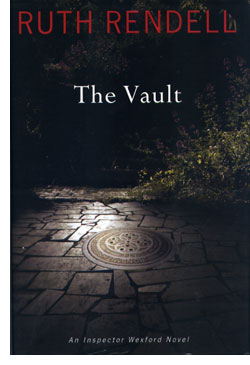 |
 |

Ruth Rendell
The Vault
Reviewed by: Rick Kleffel © 2011
Scribners / Simon & Schuster
US Hardcover First Edition
ISBN 978-1-451-62408-3
Publication Date: 09-13-2011
278 pages; $26.00
Date Reviewed: 10-01-2011
Index:
Mystery
General Fiction
The past is ever ready to rise, to be discovered and brought to light. The secrets that have been buried will hurt once again. The lies that have been concealed will be revealed. And good, honest men will always be in the path of those who wreak violence to conceal their sins.
Ruth Rendell walks both sides of the mystery and suspense aisle. In her novels of psychological suspense, she creates realistically unhinged minds and then turns them loose on an unsuspecting world. In her Inspector Wexford novels, her good-hearted, well-adjusted, well-intentioned detective goes about righting wrongs, or at least, determining who committed them and why. He often puts the doers away. And, just because Rendell as a writer is every bit as complex as the characters she portrays, in her Barbara Vine novels, she delves into history and into first-person narrative to look at crime and society in both a broader and more personal sense.
Readers who might suspect that Rendell has gone in every direction possible are in for a delightful surprise with 'The Vault,' the latest novel featuring the now-retired Inspector Wexford, who follows up on the crimes in Rendell's 1999 novel of psychological suspense, 'A Sight for Sore Eyes.' That novel concluded with three bodies in a sealed-off cellar beneath a nice house in London. 'The Vault' begins when a new owner of the house decides to put in a cellar, and unearths four bodies.
Ruth Rendell is not reticent when it comes to killing.
'The Vault' is a superb combination of police procedural and informal sequel, satisfactory on all levels. While it greatly helps to have read 'A Sight for Sore Eyes,' it's not strictly necessary. Of course, since it is one of Rendell's best novels of toe-tapping psychological terror, you can't go wrong. If you have not read it, make that a priority, and you'll enjoy this one even more.
In 'The Vault,' Wexford's retired — but that doesn't keep him out of the action. Called in to consult when the four bodies are discovered, he's got to solve more crimes than he might suspect. Rendell is a master of plotting, and plot provides many of the pleasures in 'The Vault.' In order to untangle the past, Wexford is forced to accept the present. He learns how to noodle around a bit on the computer. And he has to deal with crime in his own world, as his daughter has a comeuppance for her own misbehavior. There's a lot to untangle and Rendell knows how to make it compelling and supremely entertaining.
Rendell's novels are all character-driven, and those wherein Wexford is at the wheel are a nice break from the books in which depravity unravels the lives of those within. 'The Vault' offers the best of both worlds. Wexford's retirement is entertainingly explored, and the tormented minds that out those bodies in the vault are finely flayed for our examination. Rendell does particularly well with those on the periphery of crime, showing the ripple effects on those who are not direct victims.
One of Rendell's strong points is her sense of place, and it is particularly evident in this novel. The house she created for 'A Sight for Sore Eyes' has not aged well, but it is lovingly described. Readers will be treated to the Inspector Wexford walking tour of London. The prose that Rendell applies to both her people and her locations ensure that both are places to which we can return in our memory, should we choose to be haunted.
'The Vault' is not a long novel, but it has a depth that cannot be denied. Rendell's ferocity remains intact, even when she is writing about the very nice Mr. Wexford. At one point, he thinks that, being retired, he is without official power, that he is no Hercule Poirot. The power present on the pages belies that thought. Wexford , and Rendell, have the power to enter our memory and become part of our past; and like the past, they are hard to forget. When we need to we can go back and visit this novel in our minds. We can bring the past to light, examine it, and, if we are lucky, learn from it.
|
 |
|
|
 |
| |
Review Archive
All Reviews alphabetized by author.
General Fiction
Non-Genre, general fiction and literature.
Horror
Supernatural fiction, supernatural horror and non-supernatural horror.
Science Fiction
Science fiction, science fantasy, speculative fiction, alternate history.
Fantasy
Fantasy, surrealism and magic realism.
Mystery
Crime, thrillers, mystery, suspense.
Non-Fiction
Non-Fiction, True Crime, Forteana, Reference.
Poetry
|
|
 |
|




